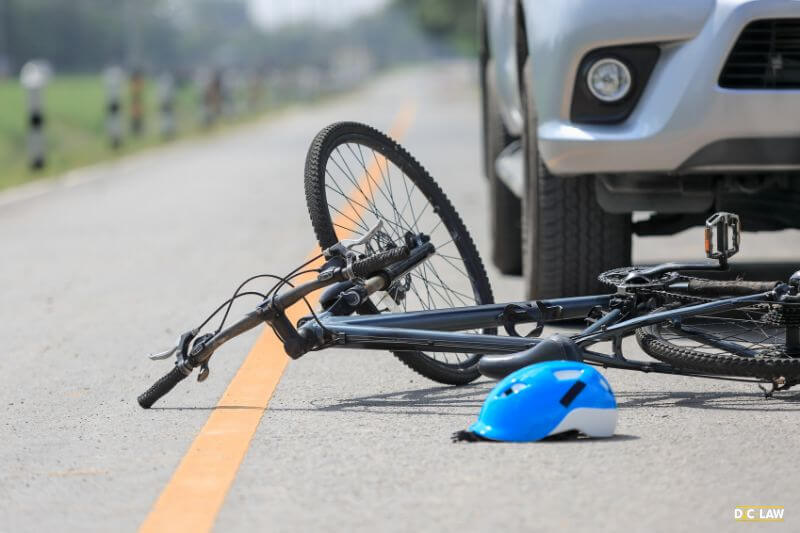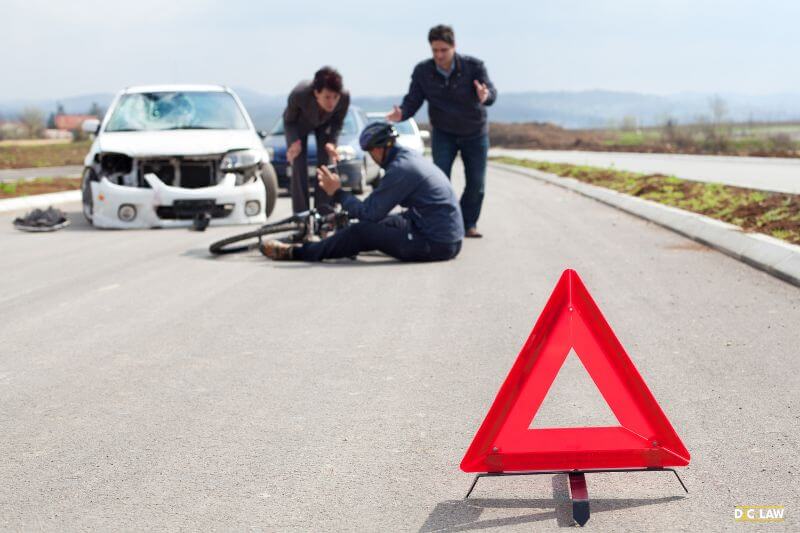
Getting hit while riding your bike isn’t just an accident; it’s a life-altering event. One minute, you’re commuting, exercising, or just enjoying the ride. Next, you’re in pain, dealing with medical bills, and unsure of what to do next.
At DJC Law, we understand how vulnerable cyclists are on Austin roads. If a driver’s carelessness put you in the hospital, our experienced team of bicycle accident lawyers are here to help you hold them accountable and ensure you’re not left paying the price for someone else’s mistake.
With decades of combined experience and millions of dollars recovered for our clients, we're committed to aggressively fighting for your rights.
You deserve compensation for what you’ve lost. Not just the hospital bills, but your time, your mobility, and your peace of mind. Let us take on the legal fight while you focus on healing. Call today for a free consultation.
Why Legal Help Matters After a Bike Crash
Bicycle accidents can be devastating, causing serious injuries and even death. In the aftermath of a bicycle accident, you may be facing expensive medical bills, lost wages from missed work, and emotional trauma.
Insurance companies will often try to settle quickly and for as little as possible. However, without proper legal representation, you may not receive the full compensation you deserve.
That's where an experienced Austin bicycle accident lawyer comes in. We understand the complexities of Texas laws surrounding bicycle accidents and have the knowledge and resources to fight for your rights.
Our team at DJC Law has a proven track record of successfully handling bicycle accident cases and getting our clients the compensation they need to recover and move forward with their lives.

How We Prove Negligence in Bicycle Accident Claims
Proving fault in a bicycle crash often means pushing back against unfair blame. At DJC Law, we know how to investigate, gather evidence, and clearly show who was really responsible.
Every motor vehicle operator must be alert while on the roadways and avoid foreseeable accidents. Drivers who fail to meet this obligation risk injuring cyclists and incurring civil liability.
Careless drivers like to claim that the cyclist caused the accident in order to shift the blame.
Hiring an Austin bike accident lawyer with experience in proving fault in bicycle collision cases is crucial when it comes to getting to the truth.
If the driver claims you were at fault, we may consult with an accident reconstruction specialist to present an explanation at trial of what happened.
The key to winning your personal injury case in Austin is establishing that the defendant breached their duty of care while operating a motor vehicle and therefore caused the accident that harmed you.
Our team of Austin attorneys will contact witnesses and gather evidence from the scene of the bicycle collision on your behalf to illustrate the defendant’s liability to a judge and jury.
What Sets DJC Law Apart?
At DJC Law, we don’t just take on bike accident cases — we understand the unique risks cyclists face on Austin’s roads. Our team combines decades of personal injury experience with a focused commitment to protecting vulnerable road users.
✔ Recovered millions for injured cyclists across Texas
✔ Local attorneys who know Austin’s bike laws and traffic patterns
✔ A legal team that keeps you informed, involved, and supported at every step
How Long Does an Injured Cyclist Have to File Suit?
In Austin, negligence claims are subject to a two-year statute of limitations, as outlined in Texas law, with few exceptions that may allow for an extension. This means that if you are involved in a bike crash, it is crucial to submit your claim as soon as possible to avoid the risk of having your case dismissed due to missing the filing deadline.
Failing to act quickly could jeopardize your chances of receiving compensation for your injuries and damages. Our team of skilled Austin bicycle accident lawyers is here to guide you through this complex process, helping you gather necessary evidence, file the required paperwork, and advocate on your behalf.
We understand the intricacies involved and can work diligently to expedite a resolution, ensuring that you receive the support and justice you deserve.
Does Texas Have Bicycle Laws in Place to Protect Riders?

Yes, Texas has specific laws designed to enhance the safety of cyclists on the road. These regulations aim to create a safer environment and establish clear guidelines for both cyclists and motorists. One of the primary laws is that cyclists are required to ride as far to the right as practical, allowing vehicles to pass safely. Additionally, cyclists must follow the same traffic laws, signals, and signs as motor vehicles, ensuring that they adhere to the rules of the road.
Texas bicycle laws also mandate that cyclists under the age of 18 wear a helmet, promoting safety and reducing the risk of traumatic head injuries in the event of an accident. Furthermore, the law stipulates that bicycles must have working lights and reflectors when being ridden at night, enhancing visibility for both the cyclist and drivers.
Additionally, Texas recognizes "safe passing" laws, requiring drivers to maintain a minimum distance of three feet when overtaking a cyclist. This provision helps to protect riders from dangerous close calls with vehicles. Moreover, cities are increasingly investing in dedicated bike lanes to improve cyclist safety and reduce the risk of accidents.
While these laws provide a framework for cyclist safety, enforcement can vary, making it essential for cyclists to be aware of their rights and responsibilities.
Can I File a Claim if I Was Not Wearing a Helmet During the Accident?
In Texas, not wearing a bicycle helmet does not automatically bar you from filing a claim or receiving compensation for your injuries. However, it can affect the amount of damages that may be awarded to you.
If it is determined that your choice not to wear a helmet contributed to the extent of your injuries, the amount you are able to receive in damages may be reduced. This is known as "comparative negligence" and is based on the idea that both parties involved in an accident may share some level of responsibility for their own injuries.
Ultimately, whether or not you were wearing a helmet should not discourage you from seeking legal help and pursuing a claim. Our team of experienced attorneys can guide you through the process and fight for your rights and fair compensation.
Why Cyclists Face Greater Danger on the Road
Riding a bicycle provides a sense of freedom and connection to the road, but it also exposes cyclists to grave dangers, especially when sharing the road with larger vehicles. Even with protective gear like a helmet, the vulnerability is real and can be devastating. Accidents between buses and cyclists can also lead to serious injuries.
The terrifying reality is that a collision with a car can harm a cyclist in two distinct phases: first, the brutal impact with the vehicle itself, and then the unforgiving meeting with the ground.
Such a double assault can lead to catastrophic injuries like paralysis, broken bones, spinal cord injuries, traumatic brain injuries, internal injuries or even the unimaginable tragedy of wrongful death.
These aren't just bicycle accident injuries; they are life-altering events that can affect not only the physical body but also the emotional well-being of the victim and their loved ones.
Our Austin Bicycle Accident Attorneys Are Here to Help
If you’ve been injured in a bicycle crash, you don’t have to navigate the legal system alone. Our experienced attorneys are here to guide you, protect your rights, and help you pursue the compensation you deserve.
Let us stand by your side, fighting for justice, and help you rebuild your life.
At DJC Law, we’ll fight to hold the driver accountable and help you pursue the full compensation you deserve. Call today for a free consultation and let our experienced team help you navigate the complexities of your Austin bicycle accident claim.
Frequently Asked Questions
How do Austin bicycle accident lawyers help bicycle accident victims?
Bicycle accident attorneys help bicycle accident victims by navigating the legal process, negotiating with insurance companies, and fighting for compensation that covers medical bills, lost wages, and other damages resulting from the accident.
What are common causes of cycling accidents in Austin?
Common causes of bicycle accidents in Austin include driver negligence, failure to yield the right of way or follow traffic laws, distracted driving, and unsafe road conditions. Other factors like defective bikes, poor visibility, or even opening a car door into a cyclist's path can also affect accident cases and result in serious injury.
How can an Austin bicycle accident attorney assist after a bicycle crash?
A bicycle accident attorney in Austin assists victims by evaluating the case, gathering evidence of driver negligence, and providing expert legal representation in a bicycle accident lawsuit to secure rightful compensation.
What should bicycle accident victims do immediately following a bike accident in Austin?
Following a bike accident in Austin, victims should seek immediate medical attention for any severe physical injuries, report the accident to the police, document the accident scene, and contact bicycle accident lawyers in Austin to discuss their legal options.
What types of compensation are typically awarded in a bicycle accident case?
In a bicycle accident case, compensation may include medical bills, lost income, pain and suffering, and compensation for any long-term disability or severe injuries caused by the accident. This often includes the cost of physical therapy, ongoing medical treatment, and any future care needed to support your recovery.
How long do I have to file an Austin bicycle accident case?
You typically have two years from the date the accident occurs to file in accordance with the Statute of limitations for Texas Bicycle Accident Claims. This applies to traffic accidents across the state, including those involving cars, buses, or hazardous road conditions.
What challenges do bike accident lawyers face in bicycle accident cases involving severe injuries?
Bike accident lawyers often face challenges such as proving the extent of severe injuries, demonstrating driver negligence, and negotiating adequate financial compensation to cover ongoing medical bills and rehabilitation costs.
Why is it crucial to hire an experienced bicycle accident attorney in Austin for bicycle accident lawsuits?
Hiring an experienced attorney is vital as these cases fall under personal injury claims, which require clear evidence of negligence and damages in order to recover fair compensation. They have specific knowledge of laws related to bike accidents and can effectively advocate for bicycle accident victims, ensuring fair treatment and maximum compensation.
I’ve been contacted by the other driver’s insurance adjuster. What should I do?
If you’ve been contacted by an insurance adjuster after a bike accident, be cautious. Their job is to gather information that may limit your compensation — and in some cases, shift blame onto you. In Texas, where fault directly affects how much you can recover, what you say could seriously impact your case.
You’re not legally required to speak with them, and you should never give a recorded statement without first speaking to an attorney. At DJC Law, we handle all communication with adjusters so you’re not pressured into saying something that can be used against you later.